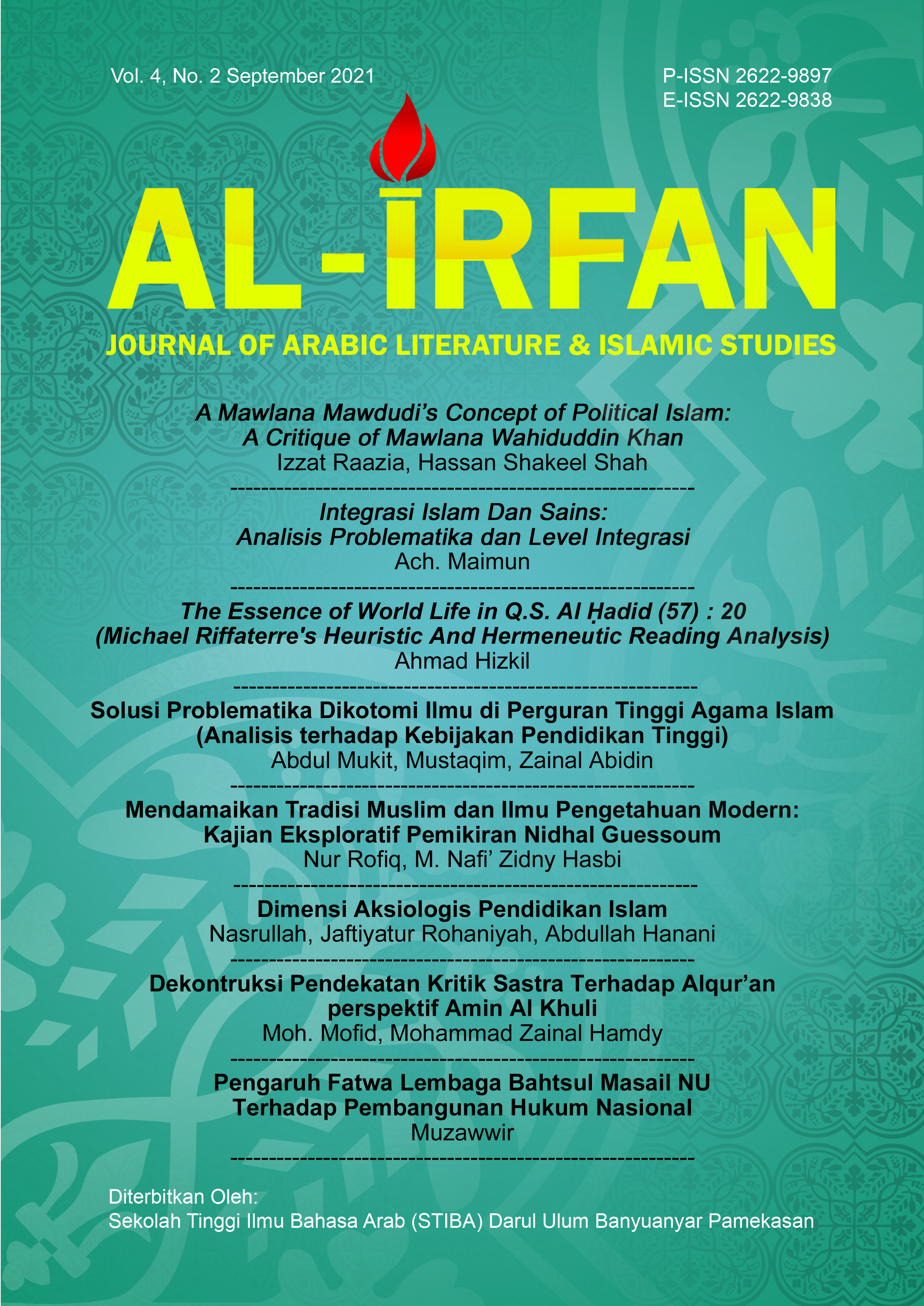Dekontruksi Pendekatan Kritik Sastra Terhadap Al-Quran Perspektif Amin Al-Khuli
DOI:
https://doi.org/10.36835/alirfan.v4i2.5069Kata Kunci:
al-Quran, interpretation, Literature, al-KhuliAbstrak
The Qur'an is a collection of texts that require a very deep understanding and interpretation. Without interpretation, the text of the Qur'an remains a text that cannot speak. Literature is the result of human creation using the medium of written and spoken language, is imaginative, delivered in a unique way, and contains messages that are relatively. The purpose of this study is to explain the literary criticism approach to the Qur'an according to Amin Al-Khuli's view, so that we as Muslims understand more deeply about the contents of the Qur'an. Literary Approach as a Knife of Analysis in Understanding the Text of the Qur'an, Literary approach in interpretation actually emerged due to the large number of non-Arabs who converted to Islam and due to the weakness of the Arabs themselves in the field of literature, so it was felt necessary to explain to them about privileges and circumstances of the meaning of the content of the Qur'an. Then in the modern era the literary approach in the Qur'an was driven by Amin al-Khuli (died. 1968 AD) at the end of the twentieth century (20). He is a professor of Qur'anic studies at Cairo University. According to Amin al-Khuli, the Qur'an is the greatest book in Arabic. One of his theses states that the Qur'an is the greatest work of Arabic literature. The Qur'an has made the Arabic language never die, and along with its status as the language that God has chosen to convey His divine messages, makes the Qur'an itself as something that does not know dry.Referensi
Adz-Dzahabi, Muhammad Husain. “At Tafsir Wal Mufassirun.†In Jilid 1. Kairo, 1979.
Al-Khuli, Amin. Manãhîj Tajdîd Fî An-Nahwa Al-Balãgah Wa Tafsîr Wa Al-Adab. Kairo: Dar al-Ma’arif, 1961.
———. Min Huda Al-Qur’an Al-Qadat Al-Rasul. Kairo: Dar al-Ma’arif, 1959.
Al-Syathi’, Bint. Maqal Fi Al-Insan. Kairo: Dar al-Ma’arif, 1972.
Al-Syirbasyi, Ahmad. Sejarah Tafsir Al-Qur’an. Jakarta: Pustaka Firdaus, 2001.
At-Tabari. “Jami’ Al-Bayan An-Ta’wil Al Qur’an.†In Jilid 2. Kairo: Dar al-Hadist, 1968.
Hamdy, Mohammad Zainal. “TELAAH KEMBALI PEMAHAMAN SISTEM KETATANEGARAAN DALAM ISLAM ( KHILAFAH ) ( Kajian Historis Dan Ideologis Terhadap Gerakan HTI Di Indonesia ).†Syaikhuna: Jurnal Pendidikan dan Pranata Islam 11, no. October (2020): 158–172. http://ejournal.kopertais4.or.id/madura/index.php/syaikhuna/article/view/4013.
Latief, Himan. Nasr Hamid Abu Zaid Kritik Teks Keagamaan. Yogyakarta: e-SAQ Press, 2003.
Muzakki, Ahmad. Stilistika Alqur’an. Malang: UIN Maliki Press, 2009.
Setiawan, M. Nur Kholis. Alqur’an Kitab Sastra Terbesar. Yogyakarta: e-SAQ Press, 2006.
Shah, Muhammad Aunul Abied. Amin Al-Khuli Dan Kodifikasi Metode Tafsir Dalam Buku Islam Garda Depan Mosaik Pemikiranislam Timur Tengah. Bandung: Mizan, 2001.
Umam, Chatibul. Pengantar Kajian Alqur’an. Jakarta: Pustaka al-Husna, 2004
##submission.downloads##
Diterbitkan
Cara Mengutip
Terbitan
Bagian
Lisensi
Hak Cipta (c) 2021 Al-Irfan : Journal of Arabic Literature and Islamic Studies

Artikel ini berlisensi Creative Commons Attribution 4.0 International License.
Lisensi :
Al-Irfan: Journal of Arabic Literature and Islamic Studies is published under conditions Creative Commons Attribution 4.0 International License / CC BY 4.0 This license permits anyone to copy and redistribute this material in any form or format, modify, modify, and make derivative works of this material for any purpose, including commercial purposes, so long as they credit the author for the original work.











